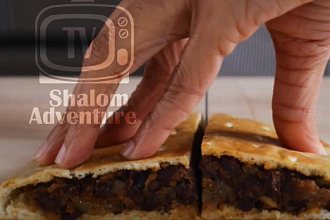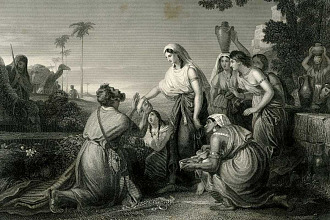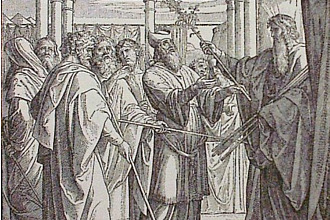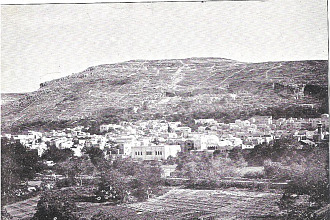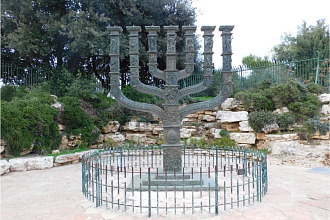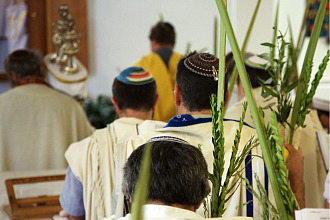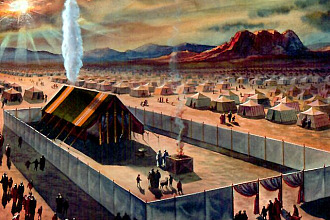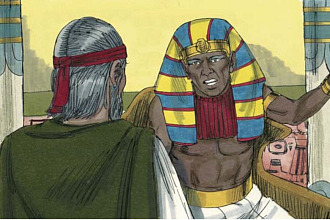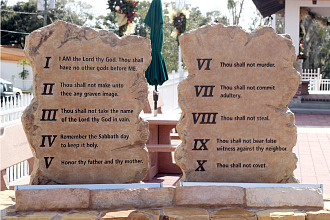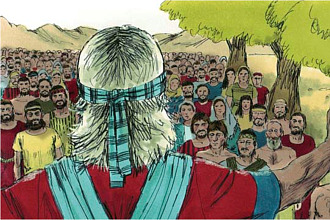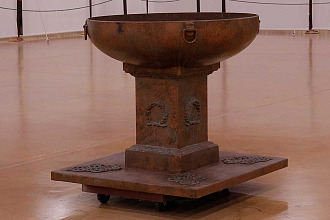Parasha for the Week: Eikev: Deuteronomy 7:12 - 11:25.
Haftarah: Isaiah 49:14 - 51:3.
Besorat Yeshua: Mark 6:41 - 52.
Overview
If Bnei Yisrael carefully observed all the mitzvoth (commandments) Moshe promised them that they would be the most blessed of the nations of earth.
Moshe tells Bnei Yisrael that they will conquer Eretz Canaan little by little, so that the land will not be overrun by wild animals before Bnei Yisrael is able to settle the whole land.
Moshe stressed that the Torah was indivisible and not open to partial observance.
The Land of Israel was described as a land of wheat, barley, grapes, figs, and pomegranates, a land of oil-yielding olives and date honey.
Moshe cautioned Israel not to become haughty and think that their success in the land of Israel was a result of their own powers or vigor; rather, it was Hashem who gave them wealth and success. Nor did Hashem drive out the Canaanites because of the people of Israel's righteousness, but rather because of the sins of the Canaanites; for the road from Sinai had been a catalogue of large and small sins and rebellions against Hashem and Moshe.
Moshe detailed the events after Hashem spoke the 10 Commandments at Sinai, culminating in his bringing down the second set of Tablets.
Aharon's passing is recorded as is the elevation of the levi'im to Hashem's ministers.
Moshe pointed out that the 70 people who went down to Egypt have now become like the stars of the heaven in abundance. Reviewed are the blessings that accompany keeping mitzvot and the curse that results from non-observance.
"Performing the Mitzvot"
In this week's Parsha, Eikev, Moshe tells the Jewish people that they must obey G-d's mitzvot in order to enter and dwell in the Land of Israel in safety and security. The Parsha begins, "it shall be because ("Eikev") you will listen to these ordinances and keep them that G-d will keep with you the covenant and mercy which He swore to your fathers. He will love you and bless you..." The name of the Parasha Eikev in this context means "because." The word Eikev also means "heel." Our sages tell us that this teaches us that a person must be very careful to perform every mitzvah, even those that may seem insignificant. Our sages tell us, "A person must be equally careful with a light mitzvah just as with a strict mitzvah."
"Fulfilled with Joy"
The Torah states, "If you hearken to My commandments which I command you this day..." (Deuteronomy 11:13). The Torah tells us that there will be a reward for observing the Almighty's commandments. There are many motives a person can have towards doing good deeds. One motive is guilt for not doing what is right. Another is fear of punishment. However, even though in verses 16 and 17 the Torah warns of retribution for doing wrong, the attitude that comes first should be joy for doing good. We eat because we enjoy eating. If a person does not eat for a number of days, his life is in danger. Yet, very few people sit down to a delicious meal and say to themselves, "I'd better eat or else I'll die." Similarly with mitzvot. Keep your focus on the joy of spiritual fulfillment. If someone has no appetite for doing good, it is an indication that He does not have the Lord in His heart. A spiritually healthy person will experience great pleasure in doing good.
"Circumcision of the Heart"
The Torah states: "And you shall circumcise the covering of your heart, and you shall not continue to be stiff-necked" (Deuteronomy 10:16). We cannot circumcise our own heart. Circumcising the heart is only done by confessing the sins in our heart - our wrong motives, our selfishness, our sadness, fears, worries, lack of faith, anger, bitterness, resentment, jealousy, etc., and allow the Great Physician to cut away these sins from our heart. Then invite the Lord to live in your heart and to live out His life in you, through you, and for you.
Rabbi Simcha Zissel of Kelm teaches us to love words of correction and to love those who try to correct you. A person who does not want to change will resent those who try to correct him. Such a person is far from improving himself. Confess any traces of resentment towards those who rebuke you. When you have a true desire for improvement, you will feel love towards those who give you suggestions on ways you can improve.
"Not our righteousness"
Moshe said: "you should know that not because of your righteousness does the Lord your God give you this good land to possess it, for you are a stiff-necked people" (Deut. 9:6). God does not love us and bless us because of what we deserve but because of His righteousness.
"Blessed is G-d"
Moshe said, "When you eat and are satisfied, and build good houses and dwell in them, when your herds and flock multiply, when your gold and silver is multiplied and when all which you have will multiply . . . You may say in your heart: 'My power and the might of my hand has made me this wealth' You shall remember the L-rd your G-d for it is He that gives you the power to get wealth." Without God we can do nothing. We owe all to Him and we should acknowledge this with a faithful returning of His tithe (His 10% of our earnings) and offerings.
"Spiritual Growth"
A father who wishes to teach his child to walk, in the beginning he will walk together with the child and hold his hand. Then he will move away from the child, leaving the child on his own. The child will then take a step toward his father and the father will retreat a bit further so that the child will take a few more steps on his own. The father will repeat this process in order to get the child to walk greater and greater distances. To the child it may seem that the father is moving away and ignoring him, yet the father does this out of love and care for he knows that the child's growth and development depends on this. At times it may seem that G-d is ignoring us, yet, in truth He always has His eyes on us and is drawing us ever upward closer to Himself. Through this process, the righteous person ascends higher and higher spiritually.
Haftarah: Isaiah 49:14 - 51:3
This Shabbat is the second Shabbat after Tisha B'Av. This period is called, Shiva D'nechemta—"Seven weeks of comfort." The seven Haftarot of the week between Tish'a B'av and Rosh Hashana are prophesies of comfort and hope for Israel and God's people at large.
Haftara: The text of Isaiah continues to comfort Israel. From time to time Israel can contemplate, "The LORD has forsaken me, my Lord has forgotten me" (Is. 49:14). The L-rd answers, "Can a woman forget her nursing child, or show no compassion for the child of her womb? Even these may forget, yet I will not forget you" (15). We already said that the L-rd loves his people with an everlasting love. He will never forget his people. "See, I have inscribed you on the palms of my hands; your walls are continually before me " (16).
"Thus says the Lord G-D: I will soon lift up my hand to the nations, and raise my signal to the peoples; and they shall bring your sons in their bosom, and your daughters shall be carried on their shoulders" (22). "I will make your oppressors eat their own flesh, and they shall be drunk with their own blood as with wine. Then all flesh shall know that I am the LORD your Savior, and your Redeemer, the Mighty One of Jacob" (26). "Why was no one there when I came? Why did no one answer when I called?" (Is. 50:2) There is a beautiful structure of the text "The Lord G-d helps me; therefore I have not been disgraced" (7) in parallel with "It is the Lord G-d who helps me; who will declare me guilty? (9).
Besorat Yeshua: Mark 6:41 - 52
As in the Haftara text, we are in a special time called "Shabbat Nachmu - Shabbat of Comfort."
Besorah: In our text of the Besorah, Yeshua not only taught the crowds and worked as a prophet, but he comforted the people by providing food. "Taking the five loaves and the two fish, he looked up to heaven, and blessed and broke the loaves, and gave them to his disciples to set before the people; and he divided the two fish among them all" (Mark 6:41). Yeshua is the new Moses, the one who was announced by Moses. Exactly as Moses gave bread from heaven, Yeshua also gave bread, but in addition to bread, Yeshua also shared fish among all these people who numbered about 5,000 people. They were all filled which means there was more food than was needed, and the rest, twelve baskets full which could be used later, was collected. This number is a reference to the twelve tribes of Israel who were fed by Moses and G-d and also to the twelve talmidim of Yeshua who also were fed and became instruments of G-d for giving more spiritual food to the people of Israel. We remember that Moses said, "In order to teach you that man does not live on bread alone, but that man may live on anything that the LORD decrees" (Deut 8:3 JPS). Yeshua did one more thing; he saw the condition of his talmidim. Working days and nights with the Mashiach, they were tired from all the work; that is why Yeshua wanted to comfort them, "Nachmu Nachmu Ami". "Immediately, He made his disciples get into the boat and go" (Mark 6:46). Yeshua cares for his people; he comforts and helps them to get rest. Only after all this work did he decide to have a close relationship with our Father in heaven, His Father. "After saying farewell to them, he went up on the mountain to pray" (47). The disciples did not get rest though; they were on the sea and once again Yeshua went to comfort them (cf. 47-52).



